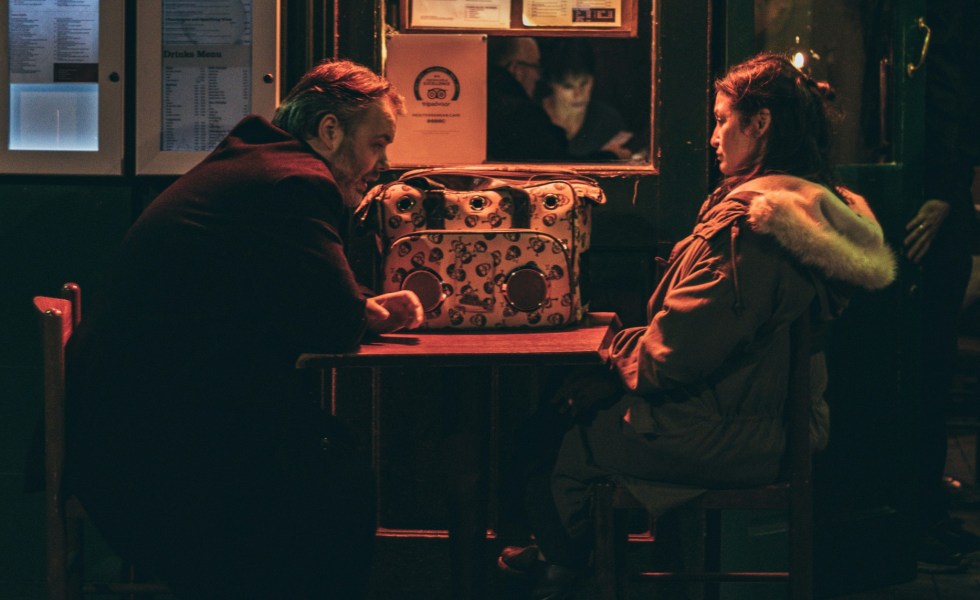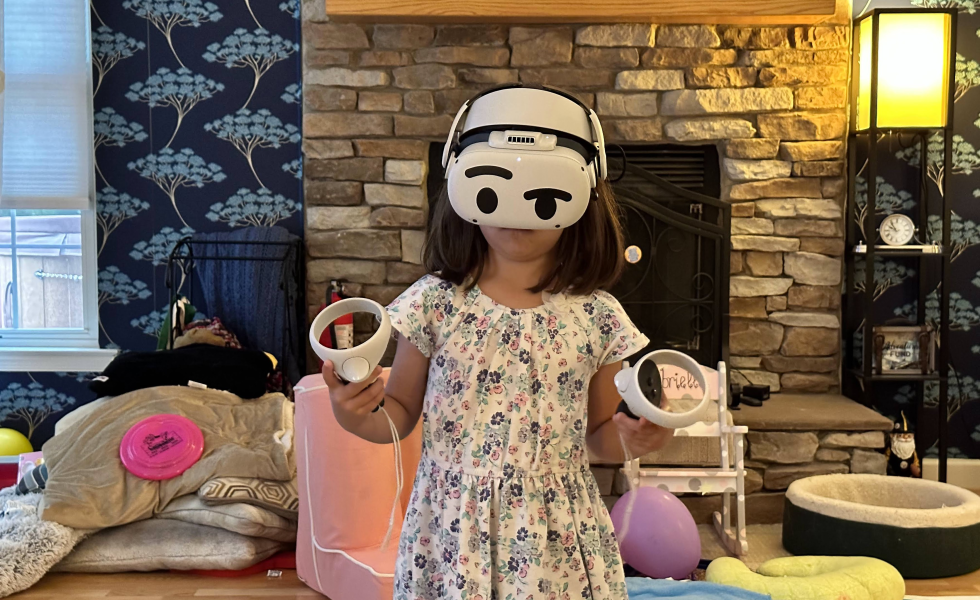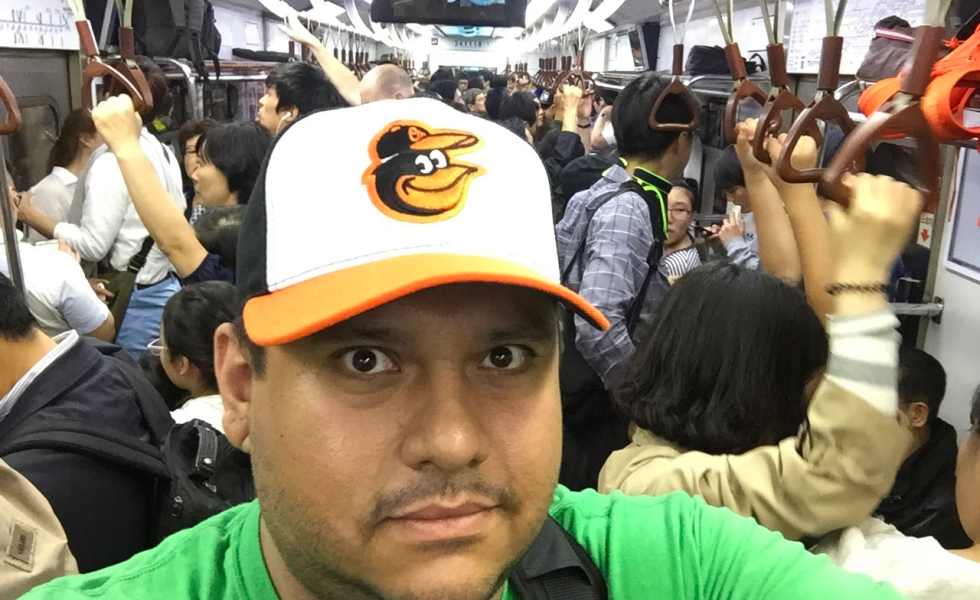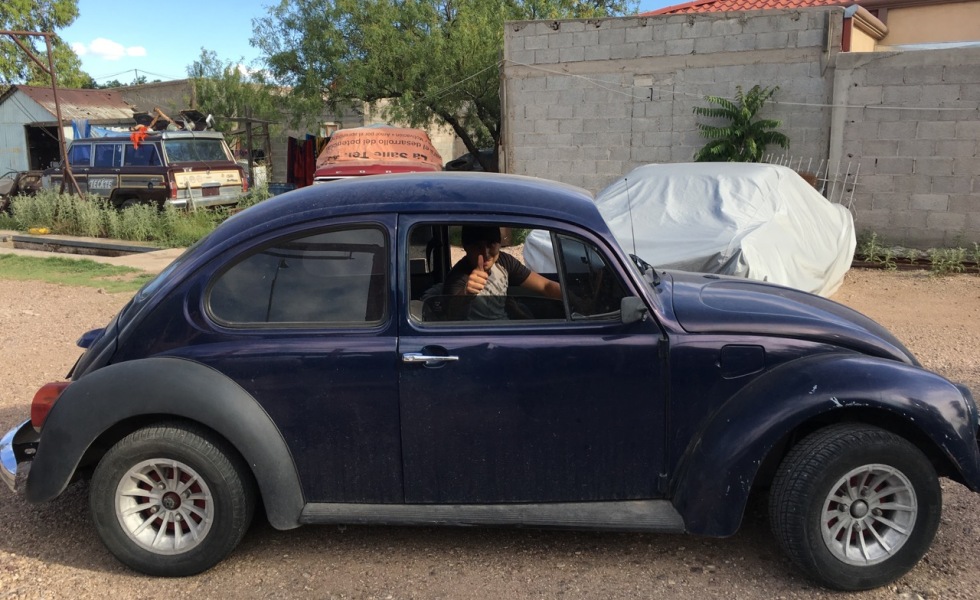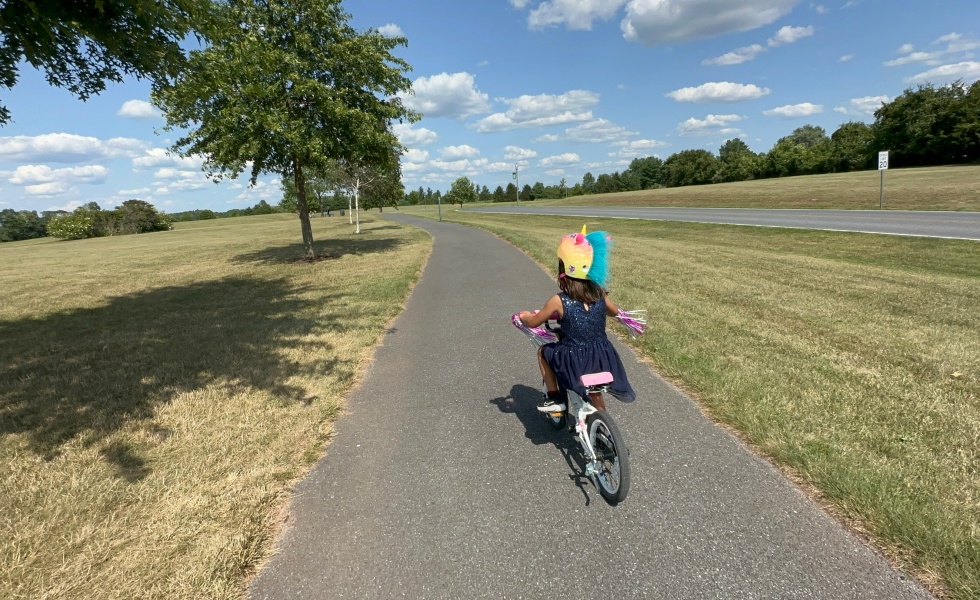The Honesty Project That Wasn’t
Posted on April 25, 2024 Leave a Comment
“Dammit,” she said. “You were supposed to be my honesty project.”
“Your what?” I asked.
“My honesty project. I was going to be honest with you about everything.” She bit her lip as she said this. “But you had to be too caring, too sweet. I couldn’t hurt you.”
“Uh… Okay,” I said. I was confused. We were sitting at a Chinese restaurant, and she dropped this on me out of nowhere. We had also just gone grocery shopping for her. It was as if someone flipped the channel, and I was now watching a drama instead of the romantic comedy that was playing earlier in the day.
I knew it was going to get more dramatic as she kept biting her lower lip. That was her tell that she was nervous, embarrassed, and anxious about the moment. “What did I do?” I asked, jokingly. I didn’t really want to hear the answer, but there we were.
“That’s the thing. You did nothing wrong. You never do anything wrong. When you commit to a relationship…”
“…I go all out,” I said, interrupting her.
“You do.”
Over the next ten minutes, she told me the story of a night a few weeks in the past. And, over the next twenty minutes, I’d go from enjoying the meal to wanting to throw it all back up.
“I was drunk, and I was stupid, and…”
“…And you’ve liked him from the get go,” I interrupted again. She lowered her eyes. She bit her lip. She didn’t deny it. “Come on,” I said. “I’ve always known you liked him. I’ve seen you swoon when you hear him playing and singing.” I was angry, but I also didn’t want to explode. This wasn’t the moment to do so. “So, you see… In a way, you were honest to me, just not outwardly honest.”
By this time, tears were rolling down her face. “We should go.”
“We should.”
“Bit by bit, you built this all in your head
And you knew goddamn well
Lays like these, they lean miss more than swing
And what makes you think that what we had was love not meaningless?
And if I’m the fool, what’s that make you?”
– The Maine, “Loved You A Little”
We walked out of the restaurant and got in her car. The drive to her place was long and silent. Neither of us said a thing. As soon as we got to her apartment, I grabbed her groceries and took them to her door. Then I jumped in the Jeep and drove off.
A few nights later, one of our mutual friends randomly asked me how I was doing. “What do you mean?” I asked back.
“I know how you and him are friends, and she told all of us what she did. So I’m wondering if you’re okay.”
“I’m okay,” I said. (I wasn’t.) “It is what it is.”
“Have you talked to him?”
“Nah. Not worth it.”
“Really?” she asked. I put down my notebook and turned around to face her.
“Look… She and I are nothing. Or, at least, we never made it official. Sure, there were dates, there were make-out sessions on her couch. But we never agreed to be exclusive. And he did what he did because, well… He’s a boy. Good looking girl comes over drunk, tells you she’s horny. What are you going to do?”
“What a bitch,” she said under her breath.
“It’s okay… Done. Done. On to the next one, right?”
“All my life, I’ve been searching for something
Something never comes, never leads to nothing
Nothing satisfies but I’m getting close
Closer to the prize at the end of the rope
All night long, I dream of the day
When it comes around and it’s taken away
Leaves me with the feeling that I feel the most
Feel it come to life when I see your ghost
Then I’m done, done, on to the next one
Done, done and I’m on to the next one
Done, done and I’m on to the next one
Done, done and I’m on to the next one
Done, done and I’m on to the next one
Done, done and I’m on to the next one
Done, done and I’m on to the next one
Done, I’m done and I’m on to the next”
– Foo Fighters, “All My Life”
I played that song loudly in my headphones as I ran down the road by her apartment a few months later. By then, she had forgotten about the boy who could play a guitar, and moved on to the older man who was a cop and paramedic. They were at her place. I could see their cars parked by her apartment building, the same cars they parked side by side where we worked.
Two weeks later, I watched a football game in the lounge outside the lab. The Steelers had won a playoff game earlier, and I watched the recorded broadcast. It was a quiet night. Nights were like that 23 years ago, especially when it snowed as heavily as it did that night. “Good game,” she said, startling me as she stood behind me. I’m usually good about telling when someone walks up behind me, but the game was too good to look away.
“Yeah, it was,” I said.
“I guess you heard,” she said with a sort of sadness in her voice. She then took a seat, holding the dinner she had just picked up from the snack bar.
“That the Steelers won?” I had no clue what she was talking about, but I could hear the drama coming on.
“He cheated on me while I was down at the beach,” she said, trailing off. “That’s why I was puking my brains out earlier. I’m sick to my stomach.”
I heard she was sick, and I had seen her walk by me very quickly as she went to the staff restroom. But I had not heard of the infidelity. “Ouch,” I said. “Must be rough.” I kept looking straight at the television. I didn’t want to tell her how I really felt.
“He broke down crying the minute I stepped in the door. Said he was drunk and just called up an old girlfriend on a whim,” she said.
“Alcohol, am I right?” I said. Half a second later, realizing what I said, I turned to look at her.
“I guess I had that coming,” she said with tears in her eyes. She then stood up and walked a few steps. “It sucks that I keep ignoring the people who count,” she said. And then she walked away.
Maybe she was talking about me?
“You called me strong, you called me weak
But still your secrets, I will keep
You took for granted all the times, I never let you down
You stumbled in and bumped your head
If not for me, then you’d be dead
I picked you up and put you back on solid ground”
– 3 Doors Down, “Kryptonite”
“I’m always around, Lana,” I told her in jest. She had gone to the lab and saw that I was working there. She did not know that I had returned to the lab after a short hiatus to pursue epidemiology. It was a good gig, and I had nothing better to do on Friday nights. Plus, my girlfriend at the time lived in that small town while I worked in Baltimore. So I would drive Friday after work straight to the lab, work overnight, and then go to the girlfriend’s apartment to sleep a few hours before we got our Saturday time together.
Those were the days when I could do stuff like that on little sleep.
“Lana? I thought I was Lois,” she said with a smile on her face.
“Oh, no, no, no,” I said. “Lana Lang moved on. She stayed in Smallville, got married. Had…” I looked at her growing belly. “Had kids.” Her cheeks got bright red. “No, Lana grew up. Clark moved to Metropolis, to become who he was meant to be.”
“Then maybe it was Clark who moved on?”
“Maybe,” I replied as casually as I could at the moment.
“What are you doing here?”
“It’s a good gig. Pays for my toys. And you know I like my toys.”
“Full time?”
“Nah, part time. Friday nights, maybe Saturdays on long weekends. I’m full time at the state health department in Baltimore.” I couldn’t help but look at her belly one more time.
What did she once tell me? About having kids? Or not being able to?
“So you drive up from Baltimore just for Friday nights?” she asked.
“Yep. And then spend the rest of my weekend with my girlfriend.”
“In Baltimore?”
“No, she’s here. She’s a physician assistant here.”
“Oh, her?”
“Yes.”
You see, a year before this little chat, she got married. The day before the wedding, while I was out on my second date with my physician assistant girlfriend, she called me to ask if I knew how to fix a chocolate fountain. Because medical technologists and chocolate fountain repair people have a lot in common, I guess? “She wants you to go and stop her from making a mistake,” my girlfriend said.
“Well, good luck with that,” I said. It was only our second date, but I liked where things were going. I loved our conversations. The two dates had been stimulating to all my senses and intellect. (And I’m happy to report this is still the case 18 years later.) “I can’t be in two places at once, and this is where I want to be right now.”
It was the best second date ever. And the last second date with anyone but the girl I’d marry.
“¿Quién te dijo que yo
Era el sueño que soñaste una vez?
¿Quién dijo que tú
Voltearías mi futuro al revés?
Ya son las 7:16
Y el cadáver del minuto que pasó
Me dice, “Tu estrategia te arruinó”
No queda más que ir aprendiendo a vivir solo
Si te quedan agallas”
– Ricardo Arjona, “Minutos”
In fact, I did not date anyone for three years before I started dating my current wife. I had decided to be alone for those three years, because I realized my choice in women was a little “off,” if you will. Between the end of college and the three year hiatus, none of the women I dated led to healthy relationships. They were all an attempt of one person to fix the other. Little known fact: You can’t fix people. They have to fix themselves.
So why am I writing all this?
That relationship was one of the many I had before I met my current wife, before we got married 14 years ago and been together 18. I “dodged many bullets,” and I’m happy with the one bullet that hit me. It did a number on me. I’m not the same person. I’m more caring. More compassionate. The world is not all about me anymore.
“Now you got me lost in emotion
Now you got me intoxicated with your drug
Bloodstream racin’, heartbeat pulsin’
The truth of it is I’m in love with you, oh,
Oh, I got touched by God and it fucked me up
Like an electrical current pulsin’ through my veins
(Lightning, come and hit me again)
I’m in my feels, way up in the clouds somewhere now
Don’t know what’s real, real
I’m ghost, gone missin’
I don’t even know if I’m here now
I’m in my feels, feels”
– Labyrinth, “The Feels”
The “honesty project” was not honesty, but an attempt to string me along for several years. I was always being notified about her conquests, her relationships and failures. She called me once to ask for directions to the airport, as she took the boyfriend on a trip to the Midwest to meet her father. She showed up at the lab and waved the ring around the night she got engaged, asking me if I thought it was big enough for her hands. (I had previously joked about the length of her fingers, which she credited for her ability to play the piano… or so she said.)
Two years ago, we had our last conversation via text message. Something about her getting divorced. It was at a time when I went through stuff, and I guess that was her way of reaching out?
Then again, the “honesty project” was a good thing. It helped me realize that some relationships can be toxic, even if we were not in an “official” relationship. Some people seem to want to pass on their suffering to others instead of just sharing that suffering. Wanting to share is normal. Wanting to bring others down so you’ll be above them? Not so much.
But it has been a little over 20 years since that day in the restaurant. Those times are best filed under “life experiences that taught me something.” Best to be remembered once in a while when you just want to write something on a plane trip to Denver. Like this time… Until next time.
“A fake Jamaican took every last dime with that scam
It was worth it just to learn some sleight of hand”
– Modest Mouse, “Float On”
Thank you for reading. Please check out more of my thoughts over on my Medium.com blog at: https://epiren.medium.com
Or listen to my ramblings on the Epidemiological Podcast: https://anchor.fm/rene-najera
Stalk me on LinkedIn: https://www.linkedin.com/in/renenajera/
Or be a total creep and follow me on Facebook: https://facebook.com/rene.f.najera
What’s that? I’ve blocked you? Well… ¯\_(ツ)_/¯
Adventures with a “debate me bro”
Posted on March 30, 2024
If you didn’t know this about me, I grew up with a lawyer for a mother. From a very early age, I got used to listening to her argue — and many times win — some very tough arguments. As a defense lawyer in Mexico, she defended the indefensible, and she stood up to some powerful me. Those experiences with her allowed me to understand the nuances of a good debate. Mainly, if you stick to the facts, there’s no room for more debate. Either there is evidence for what you’re claiming, or there is not. Or, if there is evidence, the evidence is flawed and your conclusions are confounded.
I think I chose to become an epidemiologist because of the neat line that separates evidence and opinion. Yeah, the flu is bad. I hate feeling tired, sick, and feverish. But the true measure of its severity is the risk it poses to me of sending me to the hospital or killing me. And, for me to know that risk truthfully, I have to look at a lot of data. The data will tell me the risk of bad outcomes from the flu. And it’s in those data and evidence that I’ve concluded to get the flu vaccine each year, and to have my daughter vaccinated against influenza as well.
I’m not going to lie to you and tell you that I don’t make decisions from the gut. I do. I’m only human, after all. But then I catch myself being unreasonable or illogical, and I go back to the arms of reason. Again, the facts are the facts, and they will help me win any argument. Insults and threats are better left for lesser minds… Or younger ones.
Have you heard lately of the “debate me bros”? They’re the self-proclaimed “intellectuals” and “influencers” online who bait someone into an argument, record themselves going around in illogical circles, and then monetize all of it for profit. In many cases, these debates are not even debates in the classical sense. They’re just a pair (or more) of people yelling at each other. Instead of agreeing to change their minds given the new data they’ve encountered in their exchange of ideas, they end up more isolated and divided.
The whole thing has gotten stupid:
I recently had the displeasure of meeting a “debate bro.” The man is a multi-millionnaire who became vocal about his anti-vaccine stance in the last few years. I wrote a blog post on Medium about his incomplete data analysis of COVID-19 data from California, and he… Well, he appears to have had an allergic reaction.
First, he showed up in the comments section of the blog post:
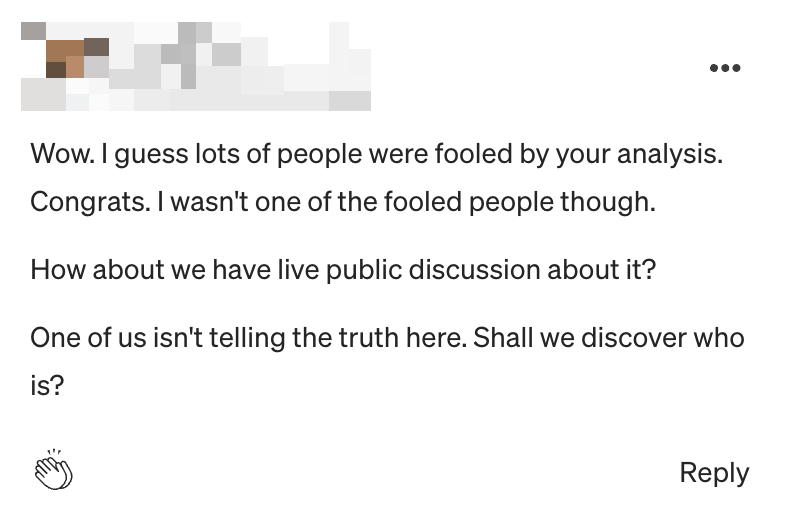
The thing is… I wasn’t trying to fool anyone. All I did was point out that in his analysis of a data set with about 118,000 records, he was only analyzing about 83,000. The rest? Well, he was doing the analysis on Microsoft Excel, using a pivot table. When doing that, the pivot table doesn’t count the records with missing data. So all of those 34,000 or so records were missing data. You need to figure out what is going on when almost 30% of your data are missing your variable of interest.
The funny part is that I didn’t say he was right or wrong in his analysis. If anything, my missing data analysis using R Studio actually gave him an out for his stance that the COVID-19 vaccine made you more likely to get sick. (It doesn’t.) But I guess he didn’t read the blog post, or didn’t want to read it. Because he then texted me:
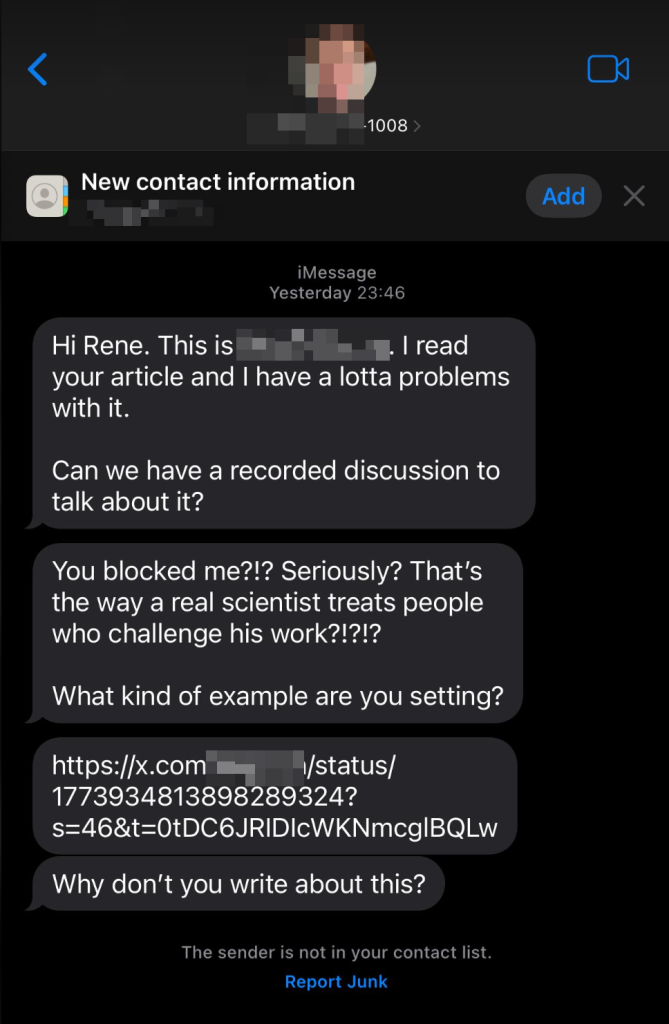
Yes, that was at 11:46 PM Eastern. He apparently lives in California, so I guess he thought text messaging someone at 9:46 PM was a normal thing to do?
When I didn’t reply to either his comment or his text message, he proceeded to email me at work. Yes, at work.

And when I did not reply, well… Let’s just say his comments call me a “cockroach” and his sycophants on Twitter claim victory over me because I won’t debate him.
LOL, as the kids say.
Apparently, this is par for the course for this guy. Check these out:
- In which he wants to debate a physician
- In which he wants to debate scientists
- In which he promotes weird anti-vaccine ideas, apparently
- In which he became a misinformation superspreader, apparently
- In which he is spreading misinformation on vaccines and Sudden Infant Death Syndrome, apparently
- In which he apparently gave cash to lawyers to fight pharmaceutical companies and others over vaccination
In other words, he has “eff you” money, and seems to like to wave it around. Unfortunately for him, I can’t be bought. I can’t be baited into a debate over truth. Threats don’t work on me. I’ve been held at gunpoint, and beaten up by a group of guys in Mexico City.
Still, I did not break.
I grew up in the “perfect dictatorship” in Mexico, with family members who were dissidents and suffered the consequences. And this old white man with cash is not an exception. He and I will never debate anything live because I’m not a debater. I’m a scientist. I’m an epidemiologist.
I am the Epi Ren. I’ve dealt with people who claim to have millions of dollars and use that — and only that — as their evidence for being right.
He can write whatever he wants about me, or about the things I write, and I will not debate him. Scientific facts are not settled in debates. They’re settled in discourse and discovery of new data and evidence. Just because you get the most clicks or the most applause does not mean you’re correct. Heck, I’d be skeptical of you if you were doing things for the clicks.
So don’t forget to like and subscribe.
Thank you for reading. Please check out more of my thoughts over on my Medium.com blog at: https://medium.com/@epiren
Or listen to my ramblings on the Epidemiological Podcast: https://anchor.fm/rene-najera
Stalk me on LinkedIn: https://www.linkedin.com/in/renenajera/
Or be a total creep and follow me on Facebook: https://facebook.com/rene.f.najera
What’s that? I’ve blocked you? Well… ¯\_(ツ)_/¯
The Parent Ren XVIII: Answering Tough Questions
Posted on January 24, 2024
I was making a peanut butter sandwich for my kid the other night when she asked me a tough question. It was a little startling because it wasn’t the kind of question one would get asked while making a peanut butter sandwich. But I guess these questions come up without a prompt, and definitely not on a schedule.
Now, I’ve been asked many tough questions throughout my life, and I’ve also had to explain difficult concepts to many people from different learning and experience levels. For example, I was about ten years old when I explained to my cousin how and why women menstruated. He asked this because he had found a used feminine hygiene product in his house. I remember how weird he was about the whole thing, but I wasn’t. I wasn’t weirded out because I always loved learning about biology. To me, menstruation is not a cultural or gender identity event. It’s a biological process humans undergo, and I didn’t have any issues explaining it to him.
But I’m probably going to leave that talk to my wife when it comes to our kid. Some things are better left explained from one woman to another, you know? This is not to say that single dads and male caretakers should not know about menstruation (and other biological processes) and how to talk about such things.
A few months ago, my kid and I had a discussion about Santa Claus. She said she suspected Santa Claus was not real, and that it was us — her parents — buying her the gifts for Christmas. “What do you think is the truth?” I asked.
“I think it makes more sense that you buy it,” she replied.
“Why?”
“Because it would be hard for just one guy to deliver all those gifts.”
“But what about magic?” I asked.
“Hmmm… No, it doesn’t make sense,” she added, holding her hand to her chin.
I’m kind of torn about these tough, existential questions, because I want to raise a critical-thinking child skeptical of fantastical claims. At the same time, I find solace and comfort in some of my beliefs that have zero tangible — or reproducible — evidence to them. When she asked me if I would look over her when I died, I told her that I would likely not, but that I was always going to be with her. “You have me in your genes, in the little lines of code that tell your body how to grow and will influence much of your life to come. You’re about half me and half your mom, so we will always be with you.” It broke my heart to see her cry at the thought of never seeing us again once we died. “But, who knows? Maybe we will see each other again. If we will or won’t, though… We gotta make the best of the time we do have here together.”
She’s such a happy-go-lucky kid that she was fine two minutes later.
Anyway, as I made the peanut butter sandwich the other night, she asked me if God was real. “What do you think?” I asked her. (You may have noticed this is my standard response to her. I want to know how she is thinking about a subject before I can formulate an answer.)
“I think he is,” she said. “But he’s invisible, so that’s sus.” (“Sus” is how the kids nowadays say “suspect.” I think she meant that it is “curious”?)
“Well, then he is,” I answered. “God is one of those concepts that we must answer for ourselves, and it is best when we come to the understanding on our own.”
She smiled and started eating the sandwich.
These conversations will not get easier with time. She is becoming more aware of the world around her, and that brings with it many questions she will ask. I think I may be prepared for most questions, but I’m sure she’ll come up with ways to throw me for a loop. Honestly, I look forward to that. I look forward to those moments where she and I will have more mature discussions, and I can pass on more wisdom than knowledge to her. (Yes, there is a difference.)
Perhaps the hardest part — and one that I am not looking forward to — is when her peers start flooding her with their views about the world, with subjective truths rather than objective facts. It’s going to be a tough time to get her to be an individual among the crowd. So better to start now with these hard conversations, answering these tough questions. Her future depends on it.
And a lot is going to depend on her.
The Parent Ren XVII: Chaos, Beautiful and Lovely Chaos
Posted on January 1, 2024
We often strive for a home that’s a picture of order and tranquility, a personal Eden where everything is in its perfect place. Yet, the reality for many of us, especially those with young explorers around, is a living space that’s more like a workshop in perpetual motion, continuously reorganized by a tiny, inquisitive force of nature. Our six-year-old daughter is the epitome of this force, a whirlwind of discovery, turning our home into a laboratory where the laws of physics are tested daily against toys, household items, and occasionally, the patience of our cat companions.
I remember listening to Neil deGrasse Tyson, a renowned astrophysicist and father himself, discuss the inherent curiosity of children. He explained that children are natural scientists, not content to be passive observers of their world. Instead, they interact with their environment, test theories, and learning through a tactile, and often messy, process of trial and error. And so it is with our daughter. Every nook of our home has become a test site for how gravity works, what happens when various substances mix, or how much a cat will tolerate.
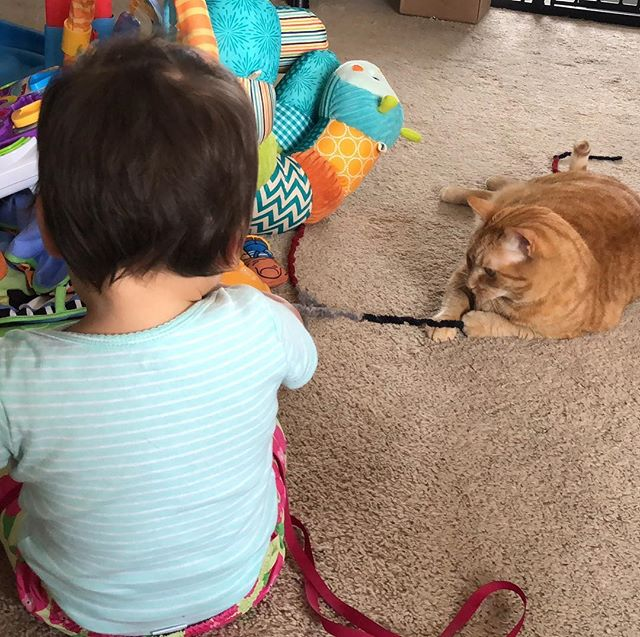
Her experiments are everywhere. The living room is often strewn with the aftermath of a pillow fort engineering project. Our kitchen bears the marks of culinary exploits far beyond the capabilities of her toy kitchen, and our once orderly bookshelves are now random assortments of books, toys, and craft supplies. “Why?” is the question of the hour, every hour, and every answer leads to a new experiment, a new mess, a new learning experience that no classroom could ever hope to replicate.
In this constant cycle of chaos and discovery, our attempts to restore order are often futile. No sooner is one mess tidied away than another appears in its wake. But as we step over scattered blocks and scrub ink from places it was never meant to be, we realize that this disorder is far from a sign of failure. It’s a sign of a healthy, active mind at work, of our daughter’s relentless pursuit of understanding and her joy in the endless wonders that fill her world.
This chaos isn’t confined to the physical state of our home. It extends into every aspect of our lives. Schedules are upended by sudden needs to explore the park or examine an interesting bug on the sidewalk. Plans are revised in light of impromptu science experiments or urgent artistic endeavors that simply can’t wait. Yet, as much as our daughter has brought disorder into our lives, she has brought infinitely more of something else: love.
Her unconditional love, bright laughter, and wide-eyed wonder at the world remind us daily of the beauty in chaos. They teach us that sometimes the best thing we can do is let go of our need for order and embrace the mess. For in those scattered toys and impromptu puddle-jumping sessions lies the heart of childhood – a brief, magical time of learning and growth that we’re lucky enough to share with her.
So, yeah, our house will never be perfectly in order, our plans will always be subject to change, and our lives will never again be as predictable as they once were. But in exchange, we’ve received something priceless: the boundless love and laughter of our child. And for that, we are eternally grateful, mess and all.

The weirdest 2023 ever
Posted on December 25, 2023
Another year is about over, and it’s time to do that thing I do where I look back on it and think of all the things I could have done differently, and how things would have worked out. Then again, if I could go back and change things, I wouldn’t. I can’t risk changing things in a way that would make the timeline worse… Well, maybe if there was a guide with me who could tell me the odds of how things work out.
The year had its ups and downs, like most years. I spent all of November and some of December sick with some respiratory infection. But at least I didn’t die, right? The rough thing about it was how long it took for me to fight off the virus. It used to be that I got over those things quickly. Not so much anymore. Yay, growing older!
The beginning of the year was marked by a bad UTI that became a little more — how can I put this delicately? — systemic. My wife and I went to the islands for last Christmas, and we didn’t exactly worry about hydrating. That, combined with the long trip to and from, and I managed to develop a kidney stone. That was complicated by the UTI. And, well, I spent most of January praying my next visit to the men’s room to pee wasn’t my last one.
Ah, but summer was great. I spent most of the time right after Memorial Day teaching my kid how to ride her bicycle. She learned in about ten days of afternoon sessions. And, once she learned, she improved exponentially. I can honestly say that it was my greatest accomplishment, teaching her how to ride a bicycle. It was bigger than my doctoral dissertation, bigger than meeting and marrying her mother.
I mean, come on… I passed on a skill that is going to come in handy for the decades to come. Because, barring some traumatic brain injury, she’s going to remember how to do it for the rest of her life. It’s one of those weird things that gets encoded in the brain close to the walking center. (It must be a balance thing.)
Of course, there was plenty of work to be done between all that fun and all those illnesses. Things in Philadelphia and other big cities are getting better, but the public seems convinced that things are worse than ever. I don’t blame them. They were not around right after the 1918 pandemic, when the United States and many other countries were on the brink of many calamities. They were not around during the Great Depression. I hear things were really bad then. And, until I see lines for soup kitchens around every city block, I won’t be ready to say things are worse than ever.
Things are worse than ever on the internet, though. More people are convinced of what they see and hear from “influencers,” and they’re more skeptical of things the experts say. Vaccination rates are slumping because parents are equating how well kids did with COVID with how kids will do with measles and other childhood diseases. (Hint: They don’t do well. One in a thousand die from measles, in developed nations.)
And then there is the cultural controversy around my place of employment. I’m not going to go into it for obvious reasons. Let’s just say it is exhausting, and it keeps other things from happening. All because of the internet and the mis/disinformation shared on it.
No, don’t ask. I won’t tell you how I feel about it because you’ll never believe me. I work there, so whatever I say will be suspect, right? So stop asking.
Finally, there are the people we lost. Just yesterday, I found out that my late brother’s mother passed away. She was found dead right on Christmas Eve. Dad called me to tell me the news, and he sounded so sad. I don’t blame him. He had known her since they were both in their 20s. It is sad to see him lose more and more people around him, especially people he loved and cared for. Time goes on.
Next month, I’ll be reaching another age milestone of my own. It’s weird to be “middle aged.” I don’t feel middle aged in spirit, but I do feel it in my knees and other joints. So I’ll be heading back to the pool and back to the gym, trying to make it a habit. My mood is better after workouts. And I’m almost indestructible from an emotional perspective when I string together several workouts.
In fact, I almost got into a fight with a dude back in the summer, and I didn’t even flinch when he squared up to me. Part of it was that I’ve been around meatheads all my life, and I can tell when someone is more “bark than bite.” Another reason was that I had strung together several workouts, including some runs, and I felt nice and relaxed as he screamed and launched spittle at me when all I did was ask him to refrain from using foul language around my kid. “Let’s go outside,” he said.
”What for?” I asked. “Tea and cookies?” That really confused him, and that’s when he decided to get up in my face and try and make me flinch. I didn’t take the bait because I never take the bait.
In the end, he was fired, his bosses apologized to me, and my kid got to see her dad not even so much as sweat in what was a pretty crazy situation. Little did my kid know that I was constantly checking her location, the nearest exit, and how to deescalate the situation. Little did my kid know that her dad was ready and willing to burn the world down if the dude so much as looked at her funny.
Ah, the joys of parenting.
So this is all for this end-of-the-year blog post. I could go into more detail of everything that has happened. But you know how to read the other blog posts, and you can always look at my social media posts. I have nothing to hide. I’m a big Boy Scout dressed in primary colors. You can see me coming a mile away.
Happy New Year.
What exactly is my culture?
Posted on December 8, 2023
I’m doing some “homework” for work, reading What If I Say The Wrong Thing by Vernā A. Myers. One of the lessons in the book is about being culturally competent. The author describes an experience in China where locals gawked her at. She felt uneasy about it at first, but quickly learned about how gawking in Chinese culture is not frowned upon. And she also learned that people in China will point and stare at people who look nothing like them.
It’s not just China, by the way. I had the same experience when I visited Korea nine years ago. I was much taller than many of the people there, and I was dark-skinned compared to almost all of them. Some kids on the metro train even took pictures, then smiled and bowed when I nodded at them. Then only other tall people where White and Black people from the nearby military base.

I also learned that it is frowned upon to take pictures of other people without their permission. A woman was on a stationary bicycle in a public event, and she was doing some sort of competition on it. I took a picture, and another woman who identified herself as the sister of the woman on the bicycle confronted me about it. She asked — forcefully — that I delete the image, which I did. Nevertheless, I took a lot of pictures in and around Seoul, and many people were in them. Most were not exactly the subjects of the photographs, but some were… I wish I would have known more of the rules, so that’s what I get for not asking.
My cultural incompetency aside, the more I read the book for my homework assignment before the DEAI training we’re getting, the more I questioned myself and my own culture. The TL;DR about me is that I was born in Mexico, raised mostly on the border between Juárez and El Paso, spent most summers and holidays in the ancestral hometown, and then moved to Waynesboro, Pennsylvania, in 2000. I worked in Waynesboro at a small hospital for seven years before going to work in Baltimore at the state health department. From there, I wento Hopkins while working as a consultant for a local health department, CDC, and a couple of companies. Then I got the job at Fairfax, and now I’m in Philly.
Which culture do I belong to, given all that? Am I Mexican because I was born in Mexico? Mexican-American because I am now a US citizen and have lived longer in the US than in Mexico? Spanish is my first language, so I am Hispanic. But I don’t speak it as much, speaking mostly English at home and at work. And, in this part of the United States, I’m more likely to run into people of Central American descent than people from the northern part of Mexico. (Those folks are more concentrated in the Southwest, with a few enclaves here and there, but not in Maryland/DC/Virginia/Pennsylvania.)
That all doesn’t stop people from coming to me to ask for help understanding people of Latin American descent. Lately, the question has been around the term “Latinx,” a non-gendered form of “Latino” and “Latina.” People want to know if it is the right term. It is and in it isn’t. To my friends and family back in Mexico, “Latinx” is confusing. And, the more I think about it, the more I’ve come to see it as an Anglicization of “Latino,” which we use in Spanish to describe someone (male or female) of Latin American descent. (Latin America being every country south of the United States, and the Spanish-speaking countries and territories of the Caribbean. We even use it to include people from Brazil as Portuguese is a “Latin” language.)
Then again, I am not someone who has lived in the United States their entire life, and I am college-educated (now with a doctoral degree). I don’t work in the service industry, or in the fields. My experience is different from the average immigrant. While I once lived in what could be described as abject poverty (and that is for a post later), I now live comfortably and have a profession only few people have. I’m not the Mexican/American/Latino everyman. This gets compounded when I am asked to be voice of the “minoritized” people where I work and/or teach. If my experience is nothing like the experience of the average immigrant, then it is definitely nothing like the experience of a Black person. This is especially true of a Black person in the United States who can trace their lineage back to the days of slavery.
This is not to say that I cannot empathize and understand the points of view and life experiences of people of a different culture and background than mine. For example, having read up on the history of slavery and institutional racism in the United States, I understand why so many Black people have trouble believing in vaccines. Seeing how people of Asian descent have been treated in the last few years, after the 45th President of the United States blamed the COVID-19 pandemic on China (and only China), I can see how they are worried of being victims of violence at any random time for any random reason. And I’ve read up on what President Jackson did to indigenous people in the 1800s, so I can see why tribes are weary of any kind of partnership or agreement with the federal government.
Getting back to the title of this blog post, what is my culture? When my brother-in-law saw that I chose “White” as my race and “Hispanic” as my ethnicity in the 2010 census, he seemed confused. I had to explain to him the difference between race and ethnicity, and the other weird categories we put ourselves into. And then I had to explain to him that my background was — for lack of a better term — “complex.” I was born in Juarez, Mexico, in the late 1970s. While I lived on the border much of the time, I also spent long summers and holidays in Aldama, a small town in the mountains in Chihuahua. In fact, I feel that I am more a son of Aldama than of Juarez.
We got our permanent resident to live and work in the United States in 1990. Mom moved my little brother and I to El Paso, where we went to school. As before, we would return to Aldama for the summer breaks and holidays. Later on, when I was in college, I would travel to Aldama on random weekends just because. (Gasoline was less than a dollar a gallon, and I had a car with a four cylinder engine.)
When I graduated college in 2000, I moved to Pennsylvania, so the trips back to El Paso — let alone Aldama — became harder to do. On the other hand, I started making friends and working on my master’s degree when I was up here, and my culture changed. Heck, I even went from tilting toward the “conservative” side of the political spectrum (thanks, Texas!) to tilting to the “liberal” side (thanks, Public Health!). Once I got married, my culture changed again, from the immature young man to the family man. And it would change again when I became a father.
So I leave the description of a culture to groups or populations, not individuals. I fit into many cultures because of my origins and experiences, but I don’t think I have one culture of my own. This also makes it difficult for me to assign any labels to myself. As with the census, I think I fit into different categories, and those categories have been applying to me because of my life experiences. And, yeah, I know that people will want to categorize me for their own purposes… But that’s for another post at a later time.
Thank you for reading. Please check out more of my thoughts over on my Medium.com blog at: https://medium.com/@epiren
Or listen to my ramblings on the Epidemiological Podcast: https://anchor.fm/rene-najera
Stalk me on LinkedIn: https://www.linkedin.com/in/renenajera/
Or be a total creep and follow me on Facebook: https://facebook.com/rene.f.najera
What’s that? I’ve blocked you? Well… ¯\_(ツ)_/¯
The Parent Ren XVI: You Owe Me Nothing
Posted on October 8, 2023
A strange thing permeates the culture of my mother’s side of my family tree. As long as I can remember, everyone seemed to keep tabs on what was owed by everyone else. To the cousins, aunts, and uncles who helped me in any way, their help for me was an investment. And they let me know.
One of them contacted me years after I had moved away. Our grandmother was sick, and he sought money to help her care. When I reminded him that she received government benefits for her medical care, he launched into a barrage of expletives about how I was “living like the rich” and “throwing our grandmother away.”
Later, when another family member was getting married, they asked me to “sponsor” an item in the wedding (like the cake, the music, or the drinks). It appeared they could not afford the wedding, so they asked people to sponsor parts of the wedding. When I said I couldn’t sponsor anything, another barrage of accusations were launched.
In both instances, the people who called me repeated the same phrase: “Our family did so much for you. You owe us.”
They seem to have forgotten it was not they who helped me. It was their parents. If anything, these two people who called me did their darnedest to derail me from the path that brought me to where I am. And, even if they helped me, that’s now how helping the people you love counts.
I was listening to a podcast episode by Dan Lebatard. He was talking about the sacrifices his parents made to give him what he has now here in America, not in their native Cuba. Dan’s guest, Katie Nolan, corrected him on this. She said to him that parents do what they do for their children out of love. It’s not about owing anything. “It’s what being a parent is… It’s wanting better for your child and setting them up to succeed and do what they want.” She emphasized this by saying Dan’s father may feel he has succeeded as a parent because of how well Dan is doing.
The discussion happens at 36 minutes into this video.
But that doesn’t seem to be the case with those members of my family. How well I’m doing — doctorate in public health, director of a public health center, teaching at two universities, father to a phenomenal little girl, and husband to a wondrous physician assistant — how well I’m doing is not a cause for feeling that they’ve succeeded. From my interactions with them, it was a zero-sum game for them. They lost because I gained. My successes translate to failures for them.
It’s a sad way to live.
So I’m not keeping tabs on any of my “sacrifices” for my daughter. They’re not sacrifices at all. It’s part of the job, part of the deal. When she rises to the occasion and succeeds, her successes will be evidence of my success as a parent. Those successes won’t be an opportunity for me to “cash in” on any investment.
Similarly, I hope she doesn’t feel like she needs to pay me back for anything I do for her.
Sure, there is such a thing as loyalty, and helping those who’ve helped you. But to carry around some “debts and assets” list in your head must be exhausting. Chasing around people to repay you for something you should have done out of love only reveals you are acting out of greed, not out of any self-professed good nature (or faith). And, as you know, I have no time for religious hypocrites.
Thank you for reading. Please check out more of my thoughts over on my Medium.com blog at: https://medium.com/@epiren
Or listen to my ramblings on the Epidemiological Podcast: https://anchor.fm/rene-najera
Stalk me on LinkedIn: https://www.linkedin.com/in/renenajera/
Or be a total creep and follow me on Facebook: https://facebook.com/rene.f.najera
What’s that? I’ve blocked you? Well… ¯\_(ツ)_/¯
Life Seems So Much Simpler When You’re Fixing Things
Posted on September 3, 2023
If you only have a minute:
This blog post recounts my experiences fixing mechanical and electronic devices, learned from my father and uncles. I share stories of helping my father through his fight with cancer, and the aspirations of my late brother, who adored a Volkswagen Beetle that our dad restored after my brother’s passing. I also reflect on the loss of my brother’s potential and hope the restoration project will help my father grieve. I plan to visit my father soon, drive the Beetle, and remember my brother while exploring the desert roads and enjoying tacos (or a salad).
You have more than a minute? Read on:
As I took my daughter’s bicycle out of the back of the car, we noticed the bell she uses to announce her presence fell off. “Daddy, can you fix it?”
“I can.”
“You’re so good at fixing things,” she said.
“I got it from your grandfather.”
As long as I can remember, I have been able to fix all sorts of mechanical things. As dad worked on cars of all shapes and complexity, I watched and learned. He taught me to use all his tools, making me memorize their names and functions. This later spread to electronics by watching my uncles work on radios and televisions. When I got my first Nintendo Entertainment System, one of my uncles opened it up and fixed it after a power surge. We sat there as he tested one circuit after another. When he found the fried contact, he soldered together a repair.
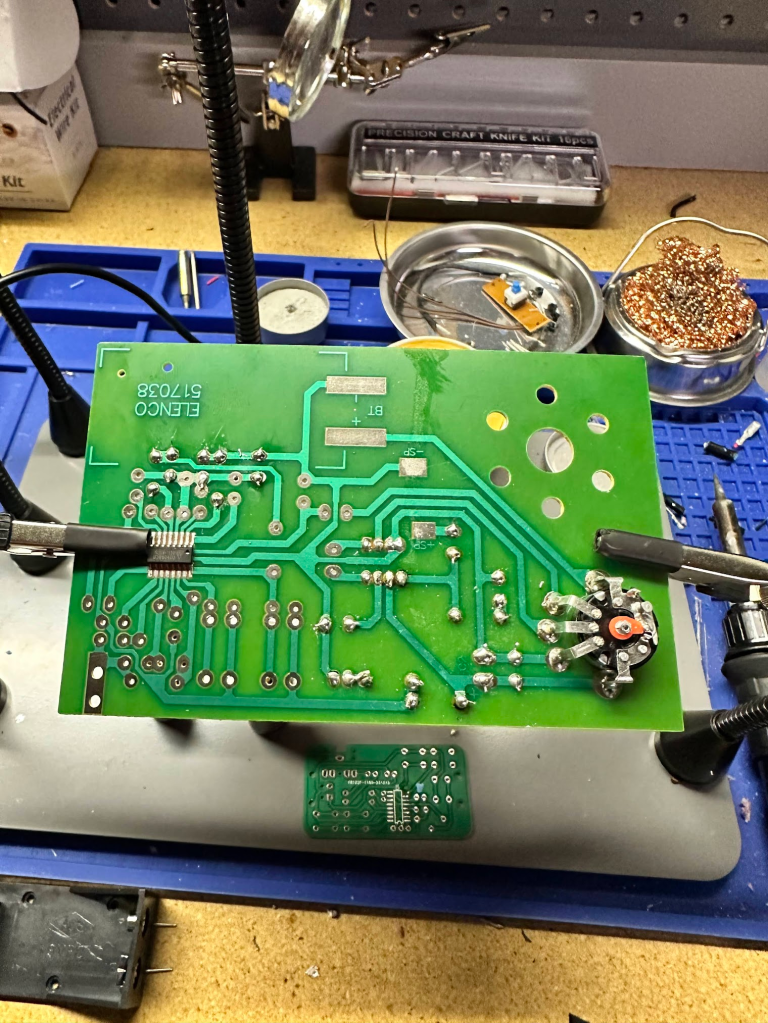
Of course, there are things you can’t fix. I could not fix the woman who was run over in front of the school. I could not fix the man who fell into the train well at the metro station. And I could not fix the man who shot himself in the mouth.
I could only help until the physicians could try to save them.
Andres and His Beetle
Back in 2016, my brother Andres and I helped dad navigate through his fight with colon cancer. Andres was there with him most of the time. When I traveled down to help set up dad with a biopsy, and then a horrendous surgery, Andres was there to help me go from one place to another. As dad rested after his surgery, we went and had dinner at a roadside taco stand. We had breakfast at a roadside breakfast taco stand. We had some great conversations.
Andres had great aspirations for himself. He studied forensic science back then, and worked at a recycling plant, separating recyclable materials from trash. He didn’t like the job, but it was a job that paid the bills. He was proud of being able to help his mother, and he was proud it was an “honest job.” Around him and in that part of Mexico, the only people who seem to get ahead either move to the United States, already come from a wealthy family, are lucky, or join an organized crime group. There are a million stories of kids drawn in by the prospects of easy cash, only to be killed by a rival gang (or the Mexican armed forces), or end up in prison.
He worked hard to break the mold, and he did. Once dad was better, Andres started forensic science school. He would tell me over text messages and phone calls how happy he was, and how everything was so interesting. Because I was an amateur photographer, he consulted with me on the best camera to get for his class on forensic photography. After looking around in local shops and online posts, he found one he could use. I sent him the money for it, and he was so happy. He said he’d pay me back someday, but I reminded him of how brotherhood works. They’re all gifts, not loans.
To help him move around, dad fixed up an old Volkswagen Beetle he had in the shop. It was an old model, one of those you now only see driven around by enthusiasts, or exhibited at classic car gatherings. In Mexico City, they were the only car driven by taxi drivers until Volkswagen ended their production. But it has always been a favorite car of my dad and his brothers.

Andres loved that thing. It was small and agile, and did not quit. If you don’t know much about these cars, you should know that their machinery is simple. They don’t have a fluid cooling system like other cars. Their engine is air-cooled. The Germans designed the engines during World War II to be minimalist engines that any small shop could repair with scrap parts. A couple of belts made from rubber or any other flexible material around transfers the energy from the engine to the alternator for electric power. I mean, look at this and compare it to the wire-heavy, electronic-intense engines of today:

Andres loved to drive that car, and he was known among his friends for having it. Whenever it needed some sort of service, dad was more than happy to work on it. Like me, you can’t put a puzzle in front of dad and expect him not to try and solve it. The man can spend hours fixing things, his tongue sticking out of the corner of his mouth, just like my daughter does when she’s working on a problem. Besides, it wasn’t like dad didn’t have plenty of spare parts around his shop.

Dad Fixes the Beetle, and Says Good-Bye
Andres died in April 2022. A few months before his passing, he skidded into a sidewalk during a rain storm and bent the rear part of the car’s frame. As with anything that has to do with a car’s frame, the Beetle was sidelined until dad could take it apart completely and either fix the frame or get a new one. But then Andres died, and the car sat waiting for months.
Dad started to work on the car to deal with grief. Thinking back on all the times he told me how therapeutic it felt to work on engines and cars, I was surprised he had not done it sooner. But we all grieve at our own pace. The car needed a lot of work, so he took it slow.
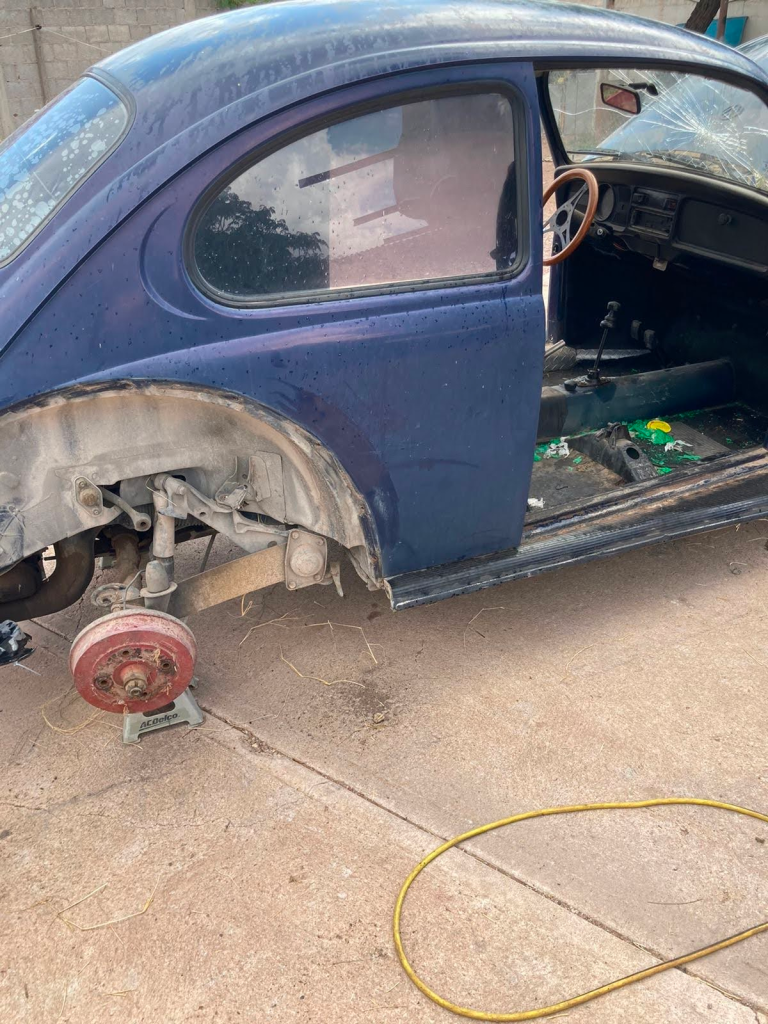
He took it off the frame to see if the frame was salvageable. It was not. It was too bent, so he looked around town for a good frame. He found one. Like the ship of Theseus, the Beetle would get some new parts.

Over the next few months, he put the car back together. He gave it a new paint job. He replaced the windshield. And he replaced the tires and wheels. He just finished the restoration this week:
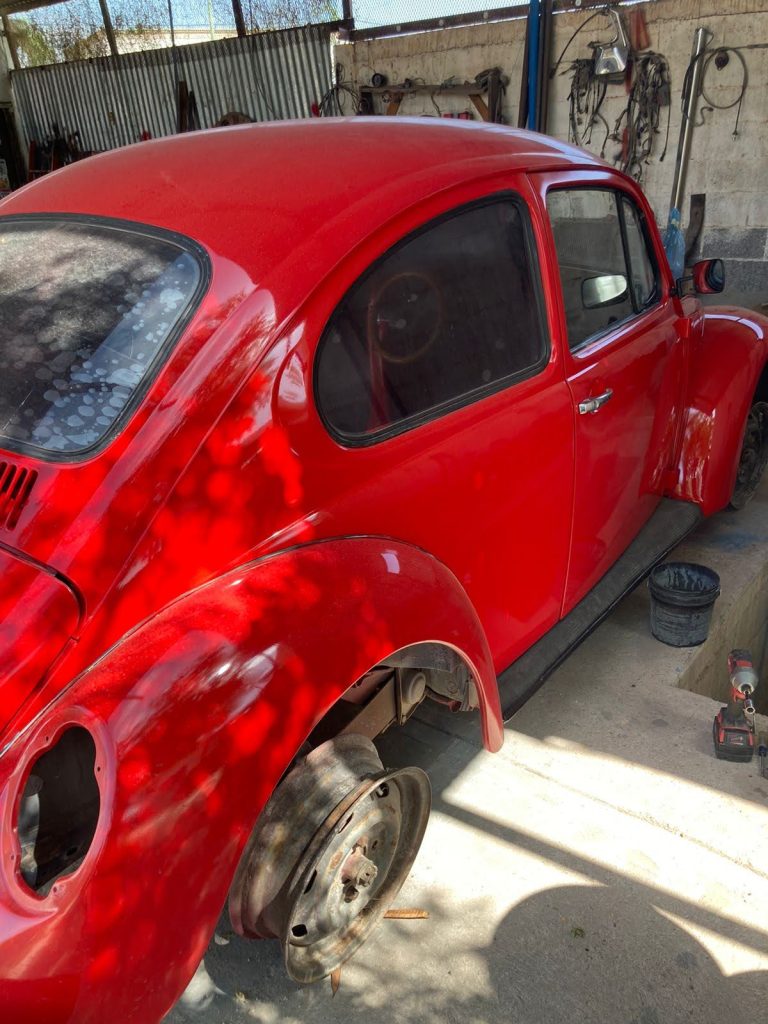
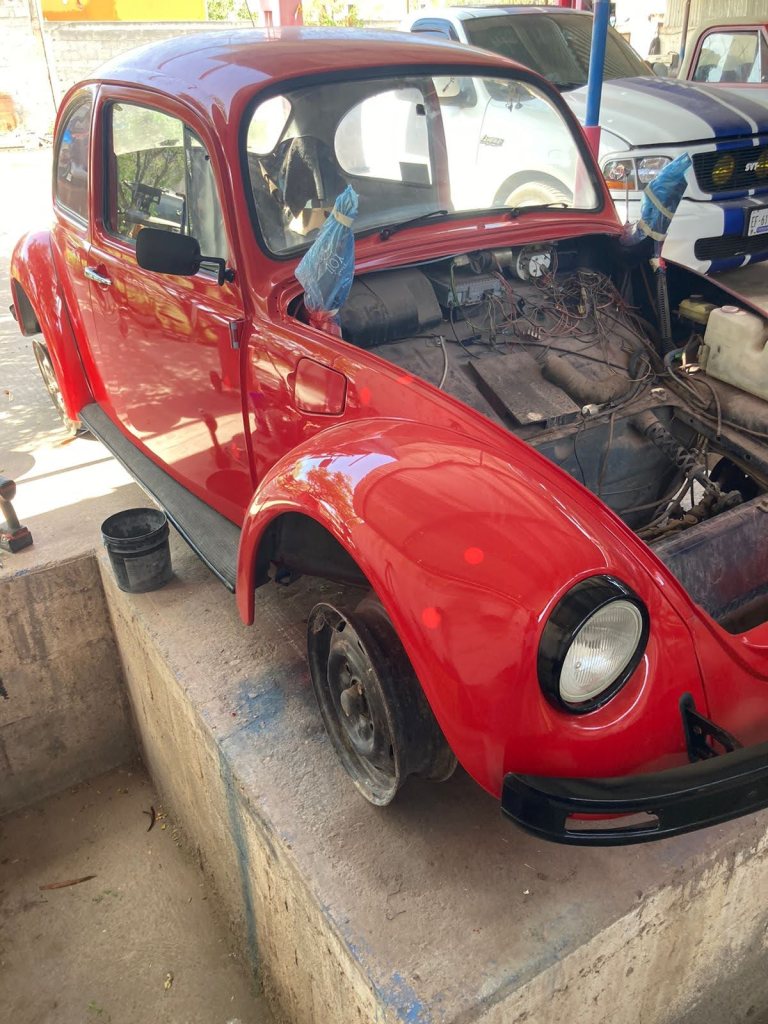
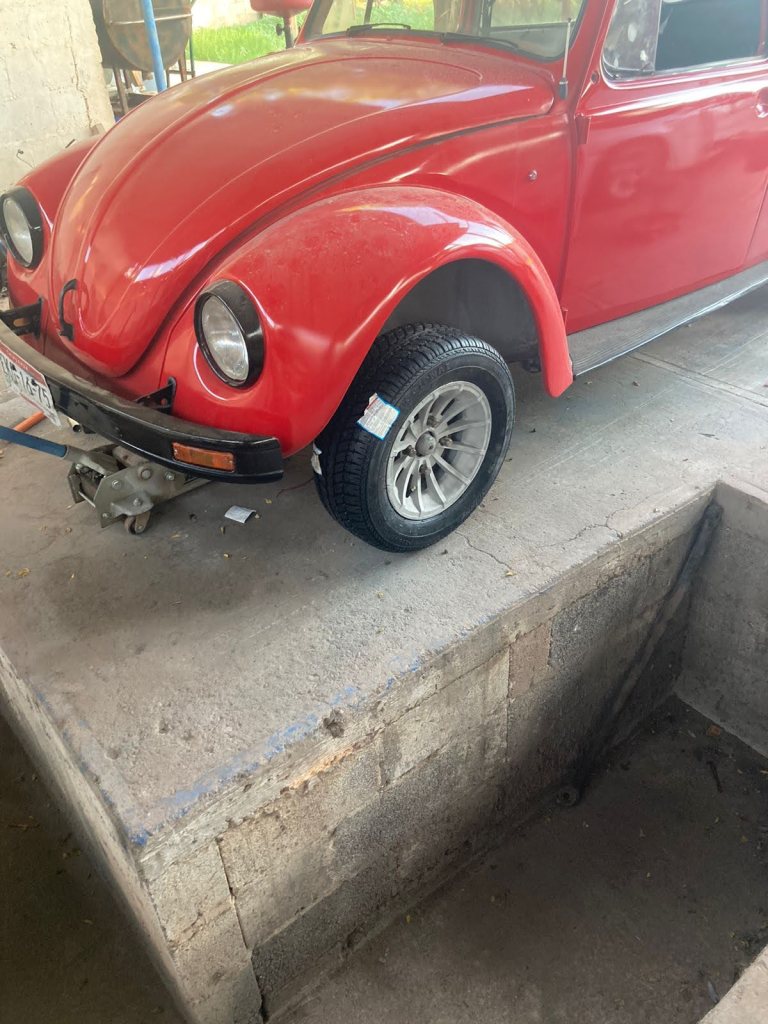
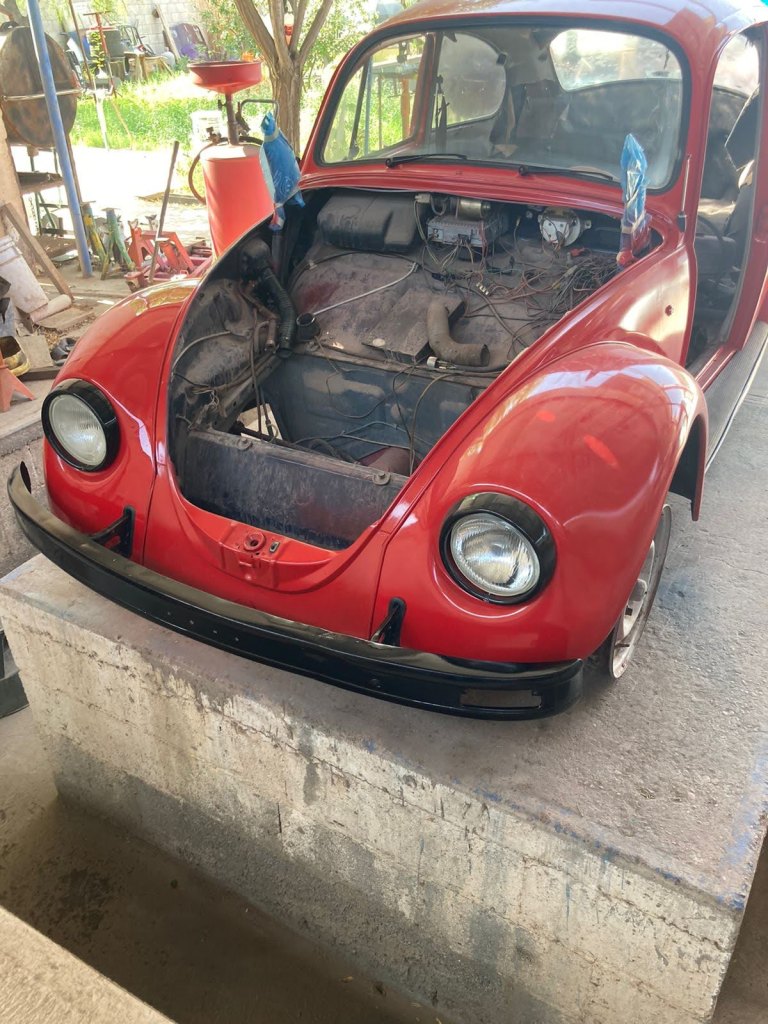
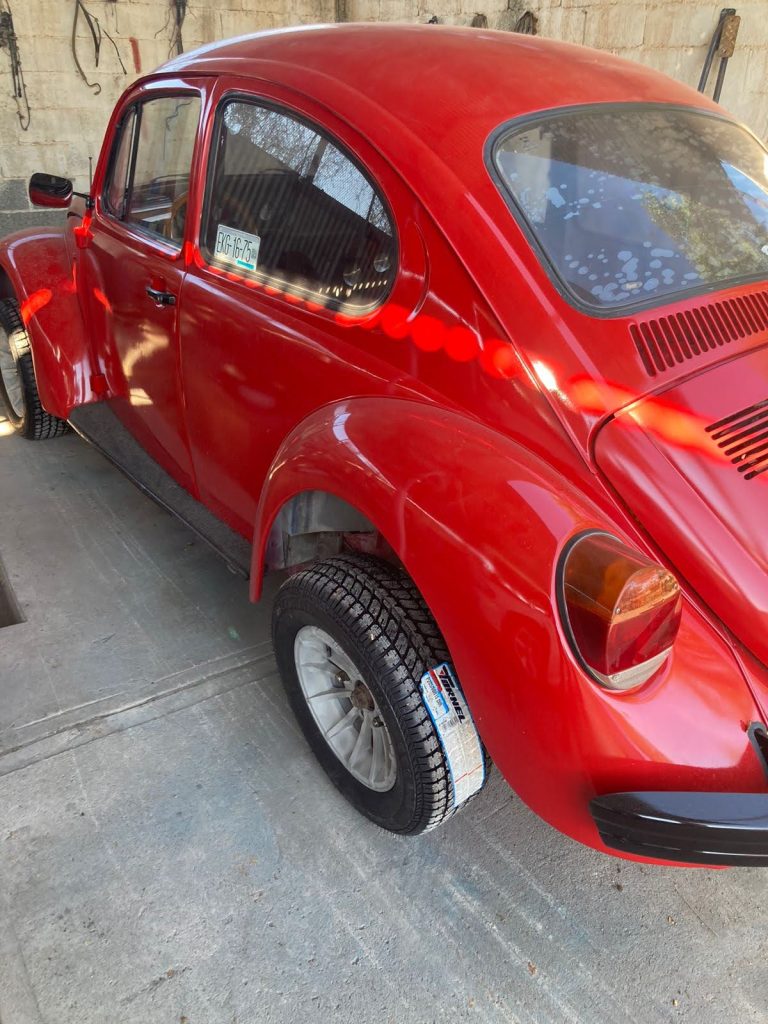
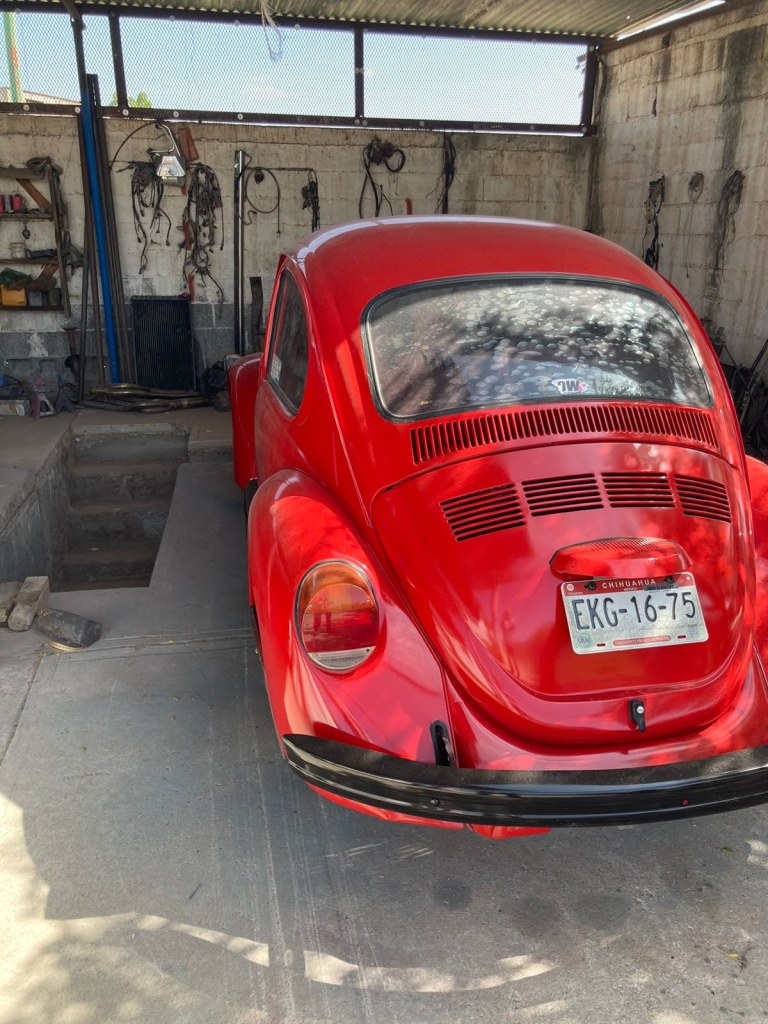
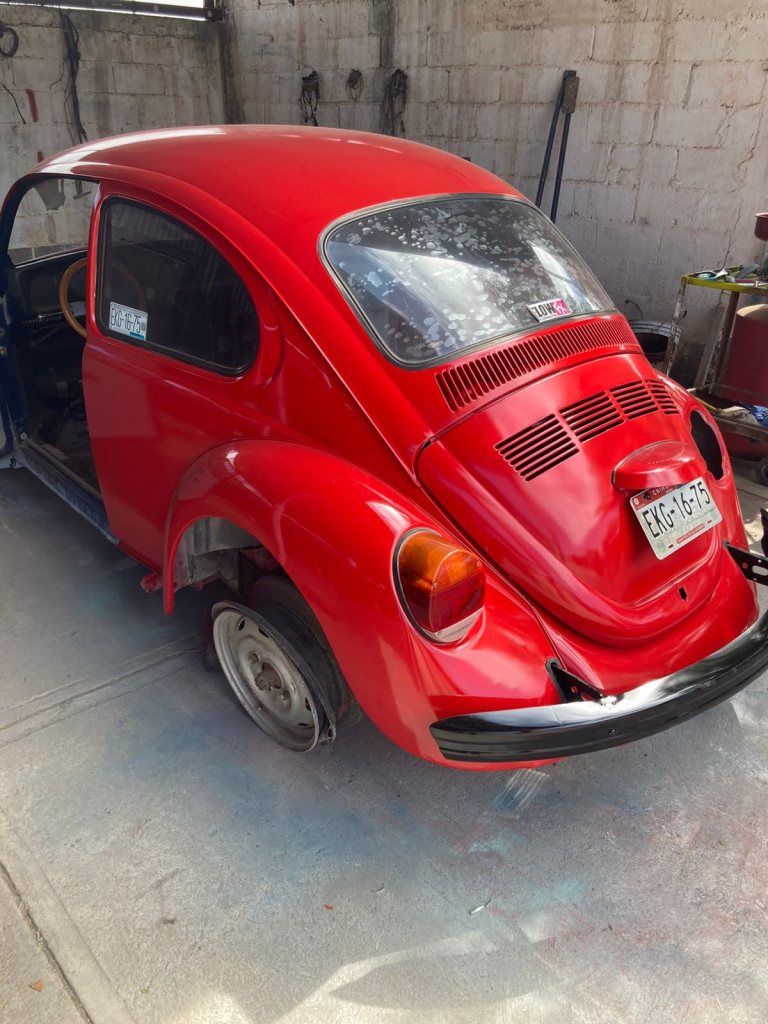
Dad was robbed of the opportunity to have a wonderful young man as a son. Andres moved from forensics with the state police to being an officer. He had a bright future, and he wanted to study law. He repeatedly said to me that he wanted to help the people of Chihuahua. He wanted to fix the ailments he saw around, the same ailments that herded people into poverty, crime, and away from opportunity and peace. I was robbed of a brother, and the opportunity to help him achieve his dreams, like I’ve tried to help my other brother and sister. (They’re both successful without much of my intervention.)
The people of Chihuahua were robbed of a champion.
We Shall Ride
I hope this project has helped dad truly grieve. I’ll be flying down to see him soon, and to drive the Beetle around a bit, maybe listening to some of the music Andres would have listened to… Maybe being with him for a little bit as we drive the old, dusty roads of the desert. We might even stop for tacos.

Thank you for reading. Please check out more of my thoughts over on my Medium.com blog at: https://medium.com/@epiren
Or listen to my ramblings on the Epidemiological Podcast: https://anchor.fm/rene-najera
Stalk me on LinkedIn: https://www.linkedin.com/in/renenajera/
Or be a total creep and follow me on Facebook: https://facebook.com/rene.f.najera
What’s that? I’ve blocked you? Well… ¯\_(ツ)_/¯
The Parent Ren XV: Let’s Ride!
Posted on August 6, 2023
This summer had many “days of days,” as I call them. The first-grader learned to ride a bicycle, and it was not an easy thing to do. It was not an easy thing to teach her. We started with a balance bicycle. I bought her a bigger bicycle when she got the hang of it. We removed the pedals from the bigger bicycle, so she could use it as a balance bike and keep on learning how to balance, turn, and manage her energy while on it. Then, one day over Memorial Day weekend, we spend several hours at a local park, teaching her to put her feet on the pedals and go.
And go she did.
She had been doing fine on level ground, but downhills were trouble for her. She was afraid of falling ever since she took a hard fall on a dirt downhill on the C&O Canal. Every time she started going downhill, she would drive off the trail and on to the grass to slow down and keep herself from going too fast. So we spent the better part of yesterday evening going around and around a loop at the park. It had two slight downhills that kept scaring her, and I kept challenging her to do it.
She cried. She cried a lot. She reminded me of my own frustrated crying when I learned how to drive. I was thirteen years old, and my mother wanted me to learn to drive “just in case.” She had me sit down on the driver seat of her old sedan. It was a stick shift, which only made things harder to do. It was Juarez, Mexico, which only worsened everything. As I tried not to hit other cars — or get hit by them — I also had to figure out the stick shift mechanism and the delicate coordination of my feet and hands. I cried in frustration as my mother kept telling me I had to continue.
I haven’t forgiven her for it. I also can’t stop thanking her for it. After a few hours, I had learned to drive manual transmission, an invaluable skill that has come in handy several times. The most important time, in my opinion, was when a buddy wanted to drive home drunk. He said no one could drive stick, so he was going to “take it slow” and try to get home in one piece. I told him I could drive his car, and I drove him home.
“I need you to take a deep breath,” I told my daughter. “This is scary, but you need to overcome that fear and be brave.”
“But I don’t want to get hurt,” she said. I hopped off my bike and knelt next to her.
“You’re wearing a helmet. If you fall, you won’t hurt your head.”
“But it will hurt if I fall and get a scrape or do something else,” she said with big eyes full of tears.
“We all fell down learning how to ride a bike. The smartest and strongest all fell down learning to ride. You’ll be no different… And you’ll be better for it.”
She took a few deep breaths and steadied herself. Then she went for it. Once she realized she was in control of the bike by controlling the breaks, the downhill wasn’t as scary. It was just a matter of managing the speed and knowing that the bicycle wants to stay up the faster it goes. “You can’t stay on it when it’s not moving,” I told her. “But you can coast and look around as long as you keep moving.”
I’m not going to lie to you. It was tough. I had hints of my mother’s teaching methods when I told my daughter maybe bicycling was not for her, and maybe we should get rid of the bike. That only made her cry harder. “Don’t get rid of my bike! I love my bike!” Moments later, she would tell me that I was being “too rough” on her. It broke my heart to think that I was imprinting on her the kind of… “rough”? … treatment imprinted on me by my mother. At the same time, I used my father’s approach of reasoning with me through my fears to get me to act.
I guess the “sins” of our parents are somehow transferred to our kids. Whether I like it or not, how I parent is heavily influenced by how my parents parented me. If I’m not careful, I’ll make the same mistakes, and the cycle could repeat with my daughter and her children. Thankfully, my wife is a wonderful mother to our child, and she keeps me in check when my parenting starts getting too “rough” or unrealistic. Because it is unrealistic to expect a five-year-old to fully understand their actions.
When they say they don’t know why they did something, they mean they don’t know. And nothing can change that other than allowing them to grow and learn to think through their actions. That little prefrontal cortex is still growing, learning, and not fully in control. The rest of her brain is writing code as quickly as possible to learn from all her experiences. And I am influencing that code. Just like I’ve taught her to ride a bike, to write innumerable lines of code on how to balance and turn the bicycle, I could teach her to save the world… Or want to burn it all down.
I don’t want her to burn the world down.
Thank you for reading. Please check out more of my thoughts over on my Medium.com blog at: https://medium.com/@epiren
Or listen to my ramblings on the Epidemiological Podcast: https://anchor.fm/rene-najera
Stalk me on LinkedIn: https://www.linkedin.com/in/renenajera/
Or be a total creep and follow me on Facebook: https://facebook.com/rene.f.najera
What’s that? I’ve blocked you? Well… ¯\_(ツ)_/¯

